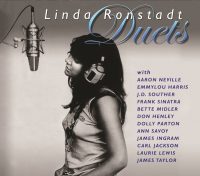Linda Ronstadt – Duets

Later this week, on Thursday, April 10, Glenn Frey of the Eagles will induct sultry songstress Linda Ronstadt into the Rock and Roll Hall of Fame at Brooklyn’s Barclay’s Centre. For her fans, it’s been a long time coming for Ronstadt, the songbird whose music has earned her 12 Grammys, two Academy of Country Music Awards, and one Emmy. Her induction also comes at a poignant time in her life for, as she revealed first to music critic Alanna Nash last year (www.aarp.org/entertainment), in December 2012 she was diagnosed with Parkinson’s disease and that disease has ravaged her voice so that she can no longer sing a note. She will not attend the ceremony since her Parkinson’s makes lying down the most comfortable position for her, and she cannot walk or stand for long periods. She admits that travel is very difficult for her these days, and she spent only a very short time touring on behalf of her recently published memoir, Simple Dreams. Ronstadt is also the first to admit that—no matter that fans have been clamoring and petitioning for Ronstadt’s induction into the Rock and Roll Hall of Fame—the honor isn’t one of which she feels especially worthy. And, Ronstadt has never thought of herself as a rock and roll singer, in spite of the popularity of her hits, “You’re No Good,” “Poor, Poor Pitiful Me,” and “That’ll Be the Day.”
Of course, her fans will disagree with her own assessment of her soaring voice, but on one aspect everyone can agree: Linda Ronstadt reigns as one of the late twentieth century’s most versatile, most adventurous, most fearless, and most generous singers. From almost the start of her career, she was collaborating with other singers, musicians, and songwriters, pushing their work into the spotlight as much as she stepped away from it. Indeed, the late, great Warren Zevon was a force in his own right, but when Ronstadt worked her tender vocal magic on his song “Hasten Down the Wind,” which gave the Grammy-winning album on which it appeared its title, she introduced him and his work to an audience who likely weren’t spinning his albums. Of course, she famously gave the Eagles their wings and they soared off.
It’s the voice, though, that captures and holds us, and now in its absence and now in the face of enduring silence from our songbird we can be grateful that Rhino Records is releasing Linda Ronstadt: The Duets just in time for her induction into the Hall. Long-time fans of hers will have all these songs in their album collection, so this album may not be an essential purchase. At the same time, it delivers a set of 15 songs that showcase Ronstadt’s great versatility and easily reminds us just why Ronstadt’s voice so often transports us to another world with its ability to weave itself around jazz riffs or melancholy pop hooks. Where else can you find a set of songs that opens with the folk minstrelsy, reminiscent of “Wayfaring Stranger,” of Ronstadt’s duet with Ann Savoy, “Adieu False Heart,” and closes with her jazzy duet with Frank Sinatra, “Moonlight in Vermont”?
The first three songs on the album come from Adieu False Heart (2006), a Grammy-nominated album that Ronstadt recorded with Ann Savoy; in addition to that album’s title track, we have the mournful ballad, “I Can’t Get Over You,” as well as the duo’s slowly cadenced version of “Walk Away Renee” that captures the sad depth of the poignancy that comes with leavetaking. Ronstadt has always had a deep country sensibility—showcased on her first two albums, Hand Sown…Home Grown (1969) and Silk Purse (1970) and her collaboration with Dolly Parton and Emmylou Harris on Trio (1987)—and Duets also captures some her best performances of that musical style. From her classic Heart Like a Wheel comes her duet with Harris of the Hank Williams’ standard, “I Can’t Help It (If I’m Still in Love with You), and from Simple Dreams comes her collaboration with Parton on “I Never Will Marry.” Ronstadt carries on the bluegrass waltz tradition in her duet with Carl Jackson on “The New Partner Waltz,” from Livin’, Lovin’, Losin’: Songs of the Louvin Brothers (2003). The highlight of the album is “Pretty Bird,” a high lonesome a capella bluegrass duet with the great songwriter and bluegrass guitarist Laurie Lewis which is the only previously unreleased song on the album. Other highlights of the album are Ronstadt’s Grammy-winning collaborations with Aaron Neville, “Don’t Know Much” and “All My Life,” that appear on her Cry Like a Rainstorm, Howl Like the Wind (1989), her duet with James Ingram, “Somewhere Out There,” and the infectious, rowdy “Sisters,” with Bette Midler, from Bette Midler Sings the Rosemary Clooney Songbook (2003).
Ronstadt and her longtime manager John Boylan worked with Rhino to craft this album by helping to select the songs that indeed illustrates the arc of the development of Ronstadt’s great vocal versatility, her canny selection of the songs that would showcase her vocal range and capacity, and her ability to weave her soaring voice around the voices of others in perfect harmony. Duets reminds just how much Ronstadt has meant to the world of music and just how much we miss Ronstadt and her crystalline voice.


